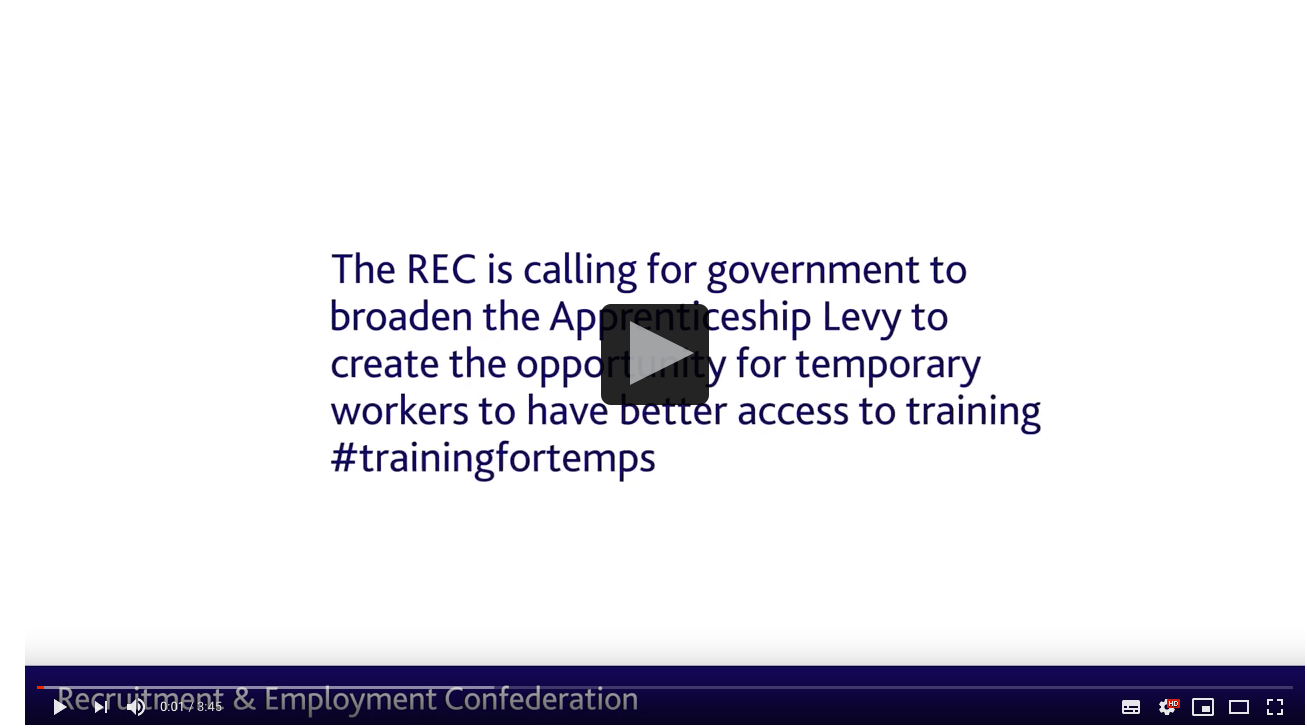Government policy fails almost one million temporary workers

960,000 temporary workers could benefit from better skills training if government let them access the training funds their agencies pay to the Treasury.
Courses which could lead to significant pay rises and higher productivity would be unlocked if money paid for the Apprenticeship Levy could also be used on other high quality qualifications as part of a skills levy.
The REC is today launching a petition calling for the government’s Apprenticeship Levy, which is poorly designed, inflexible and doesn’t reflect modern working practices, to be changed to a flexible training levy. Just 670 REC members already have £104 million of Apprenticeship Levy funds between them going unspent, because it can’t be used to support the temporary workers on their payrolls. CEO of the Royal Society for the encouragement of Arts, Manufactures and Commerce (RSA) Matthew Taylor, who wrote the Good Work Plan for the government, which sets out their vision for the future of the labour market, also supports re-examining the design of the levy.
The REC is today also launching a new research report Training for Temps, which provides evidence and statistics to back up the importance of reform.
Neil Carberry, Chief Executive of the Recruitment and Employment Confederation said:
“The Apprenticeship Levy was designed with the best of intentions, but everyone knows it is not working as intended. It’s time for reform.”
“As we redesign the levy, keeping support in place for apprenticeships matters, but we must end the scandal of locking temporary workers out of the system. Employers are paying a levy for them – but can’t use it to support their development. 95 per cent of REC members who pay the levy cannot use the funds available to them to train their staff.
“Our monthly Report on Jobs survey tells us that there are skills shortages in areas that training temps using levy funds could help to address, like hospitality, and health and social care. Recruiters are already doing what they can – but the contribution the recruitment industry could make on skills and progression would be hugely amplified if the government broadened the scope of the training Apprenticeship Levy funds could pay for. Letting agencies access the levy funds HMRC takes from them to provide quality training to temps would be transformational for career progression, productivity and inclusion. It would be a win for government, employers and temporary workers themselves.
“One of our members told us they would use a reformed levy to enable their staff to ‘secure longer-term sustainable employment and build their personal resilience’. We should be helping these well-intentioned employers unlock productivity in their workforce by using the levy to train temps.”
Commenting on the new REC research report outlining the case for reform of the levy, Matthew Taylor, CEO of the RSA, said:
“This persuasive report identifies a weakness of apprenticeships as they are currently structured; namely that they cannot be accessed by employment agencies and the employees they place. As the report argues, this is particularly frustrating given these employees are among those who would most benefit from additional training”
“As the government continues to evaluate and review the apprenticeship system I hope it will give proper consideration to the well-made argument in this timely report.”
Robyn Holmes, founder and Managing Director of recruitment agency Prime Appointments, said:
“The Apprenticeship Levy is a frustration for us. We pay £30,000 annually into a pot but it can’t be used to help our temporary staff get work. For example, the care sector is rightly very onerous with compliance so requires training. A lot of people want to become a carer but can’t afford to do the training. We would be delighted to use our levy to be able to train them. It would enable people to go out and do a job that is important for society and one they love.”
Employment agencies are often in the unique position of employing temporary workers in order to provide staff to other companies. This makes them eligible to pay the government’s Apprenticeship Levy, despite in many cases being small businesses at their core with only a few directly employed staff. The government’s existing policy doesn’t acknowledge that more employers rely on skilled temporary workers and more employees want to do temporary and flexible work.
The REC’s petition urges the government to reform the levy so that temporary workers can train in courses such as LGV driving and healthcare support, addressing key shortages and helping them grow their careers. These quick interventions are cost-effective and increase pay and progression opportunities for workers, but aren’t supported by the existing levy which is designed to promote training only for people in permanent, longer-term roles.
Temporary workers, whether they choose to work this way for the flexibility benefits it brings or because they are temping while looking for a permanent role, will often benefit more from investment than managers and senior staff, who are more able to access training under the current system.
See below a table of skills shortage areas and the training that could be funded by a reformed levy to ease the demand.

Notes to Editors:
- An apprenticeship lasts a minimum of 12 months but 960,000 out of 1,020,000 temp and contract workers in 2017/18 were on assignment for less than 12 months. This means 98% of workers on temp/contract assignments were automatically excluded from taking up apprenticeships.
- The apprenticeships programme in England is intended to allow people to develop the knowledge and skills required for their occupation, and help boost productivity. But the way the current Apprenticeship Levy scheme operates means that a disproportionately high number of recruitment businesses pay the levy without being able to use funds in their account on training for agency workers.
- According to REC estimates, over 670 levy-paying members – the vast majority of which are SMEs that supply agency workers – pay approximately £110m into the levy each year. Most of this money goes unused by their own businesses and could be used to train temporary workers. The figure is significantly higher when you take into account contributions to the levy pot made by non-REC member employment agencies.
- In a survey of REC members in March-April 2019, almost half (47 per cent) of survey respondents had been unable to use any of the funds paid into their account so far. Three in five (61 per cent) respondents identified a lack of flexibility on training opportunities as barrier to using the Apprenticeship Levy funds. Meanwhile, more than half (53 per cent) stressed that the reason why they have been unable to use funds in their levy account is because their workforce is on agency contracts.
- Levy funds can only be used to pay for training for 24 months from when they enter employers’ accounts before they begin to expire on a rolling month-by-month basis. As a consequence, the first tranche of unused funds in the employers’ levy pot expired in April 2019.
- In the 2018 Autumn Budget the Chancellor announced that a review of the Apprenticeship Levy post-2020 would be a welcome opportunity to reshape and reset the levy so that it works better for workers, businesses and the wider economy.
- The petition can be found here.
- An agency worker is any worker who has a contract with a recruitment agency or employment business but is supplied to work temporarily for another business/a hiring client. The worker is paid by the recruitment agency or employment business.
Press enquiries:
For more information, contact the REC Press Office on 0207 009 2157/2129 or [email protected]. An ISDN line is available for interviews on 0207 021 0584.
See this article on the REC website

